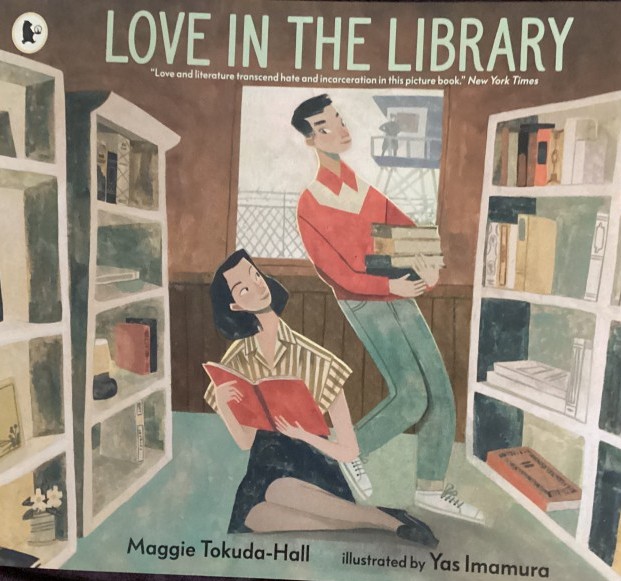Inspiring Young Readers
 posted on 18 Sep 2024
posted on 18 Sep 2024
Love in the Library by Maggie Tokuda-Hall, illustrated by Yas Imamura
In addition to the monstrous death and destruction that war inflicts on everyone caught-up in conflict, there are also terrible injustices inflicted on innocent people when scapegoats are sought and whole communities become pariahs. There are terrible examples of this throughout history but there can be few injustices as egregious as those inflicted on anyone of Japanese heritage who happened to have made their homes in the USA when it declared a state of war with Japan in 1941 following the attack on the American fleet at Pearl Harbor.
Something in the region of 120,000 Japanese-Americans were rounded-up and moved into ‘relocation centres and incarceration camps’ – forced to take only what they could carry. They not only lost their freedom, they lost everything.
The truth of that history is told briefly but touchingly at the end of this book by the author – who is herself of Japanese-American heritage – because this is the true story of how her maternal grandparents met and fell in love in these otherwise terrible circumstances.
Tama works in the makeshift library that has been built in the Minidoka internment camp in the western USA (it’s a real place and you can read about it here ). It’s brutally hot in the summer and terribly cold in the winter. The people kept there have no space or privacy and facilities are crude. Tama loved books and because she had no idea how long she would have to stay in Minidoka, they seemed to be her only consolation and working in the library was a release of sorts.
Then along came George, a young man with a big smile, who started coming to the library and taking out far more books than he could ever read. It soon became clear that it wasn’t just the books that George was interested in.
Love blossomed despite everything:
“To fall in love is already a gift. But to fall in love in a place like Minidoka, a place built to make people feel like they weren’t human – that was miraculous.
That was humans doing what humans do best.”
This is the story of the triumph of the human spirit over injustice and adversity. But, you might say, that was eighty years ago and that couldn’t happen now – could it? But as the author says in her afterword:
“As much as I would hope this would be a story of a distant past, it is not. It’s very much the story of America here and now. The racism that put my grandparents into Minidoka is the same that keeps children in cages at the border.”
And there are lessons for us here in the UK too in the way that we talk about and treat those people seeking refuge and asylum. If we don’t understand the lessons of history, we are doomed to repeat our mistakes.
Available now from Walker Books, you will be able to get a copy from your local independent bookshop – who will be happy to order it for you if they don’t have it on their shelves.
Terry Potter
September 2024